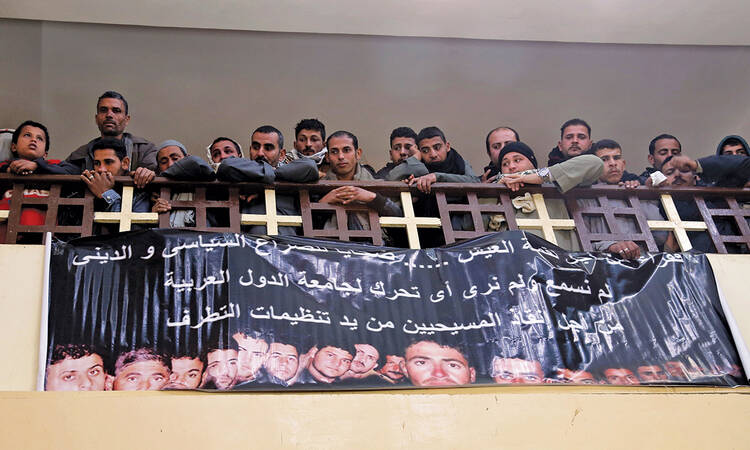The leader of the Catholic Church in Libya called for dialogue and understanding in his violence-torn country on Feb. 16, even as prayers and calls for action followed the horror of the beheading of 21 Coptic Christians. The men, who had come to Libya from Egypt in search of work, had been kidnapped in two separate incidents in December and January by extremists operating in self-professed allegiance to Islamic State. Their deaths provoked universal outrage in Egypt; the government declared seven days of mourning and launched retaliatory air strikes on extremists’ training camps.
Bishop Giovanni Innocenzo Martinelli, apostolic vicar of Tripoli, has vowed to stay in Libya even as the last foreign nationals scramble to escape. Speaking to Vatican Radio, he confirmed that jihadi militants were currently in the city and that at any moment he and his parishioners could be taken by terrorists. But Bishop Martinelli said he is not leaving his church and the few Christians left in Tripoli. “We are ready,” he said, “to bear witness to whom we are and to what we do, according to the words of Christ.”
Martinelli denounced a lack of dialogue aimed at ending the nation’s crisis, arguing that the international community should sponsor talks with the opposing sides in a divided nation that needs—first of all—to find internal unity. Referring to the nations of the West, he said, “We have helped ourselves to oil; we have guarded our own interests, we have put dialogue and a sincere human exchange between [different groups] to the side.”
At his morning Mass in Rome on Feb. 17, Pope Francis called for prayers for the slain Egyptians he called “our 21 brother Copts,” and he asked people to pray for the victims so “that the Lord welcome them as martyrs.”
Cardinal Pietro Parolin, the Vatican secretary of state, said, “The situation [in Libya] is serious, and it demands a united response from the international community—a rapid response, the quickest possible from the U.N.” Jordan’s King Abdullah II, whose country is also fighting Islamic State militants in neighboring Iraq and Syria, called the beheadings of the Egyptian Christians a “heinous crime” committed “at the hands of the terrorist gang...hostile to all human values.”
Jordan’s information minister, Mohammed al-Momani, accused the Islamic State of “inciting blind hatred” with the killings, while the Rev. Rifat Bader of the Catholic Center for Studies and Media in Amman called the beheadings a “crime not only against Arab Christians, but a crime against humanity.” The foreign minister of the United Arab Emirates, Sheik Abdullah bin Zayed Al Nahyan, meanwhile, referred to the Islamic State extremists as “sick souls frantic to shed the blood of innocents.”
Auxiliary Bishop William Shomali, chancellor of the Latin Patriarchate in Jerusalem, noted that President Mahmoud Abbas of Palestine called for three days of mourning following the beheadings. “It is unbelievable that this is happening in the 21st century,” said Bishop Shomali. “There is too much brutality. But what gives us comfort as Christians is the strong Muslim reaction against [the beheadings]. We do not feel alone, and Christians are united with all moderate Muslims, who are the majority.”








